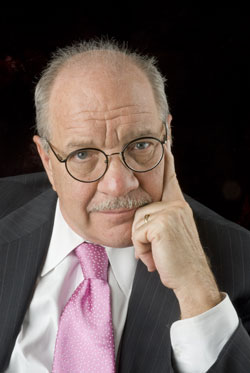Paul Schrader recently appeared on The Bat Segundo Show #255.
Paul Schrader is a filmmaker who is most recently the director of Adam Resurrected. The film opens in limited release on December 12.

Condition of Mr. Segundo: Waiting for Deborah Harry to call him.
Guest: Paul Schrader
Subjects Discussed: Being asked to direct vs. originating a film project, Jeff Goldblum working against his natural tics, Goldblum’s considerable preparation for the role, balancing the element of play with too much preparation, making a film from Yoram Kaniuk’s untranslatable novel, initial efforts to adapt Adam Resurrected, defying the fixed notion of a Holocaust film, adapting books into films, working with cinematographer Sebastian Edschmid, mimicking the memory of specific historical times, making a film without the prospect of financial returns, why the present time is the worst for independent film, clarifying the details about Extreme City, recent events in Mumbai, the opening scene in Lolita, allowing for a minimum of verisimilitude within a magical realist narrative, actors barking like dogs, clearing up some of the information in Peter Biskind’s Easy Riders, Raging Bulls, keeping a loaded gun, Sam Peckinpah, the importance of being crazy, and whether or not Schrader has exorcised all of his demons.
EXCERPT FROM SHOW:
 Correspondent: Did you have any of the actors study dog movement at all?
Correspondent: Did you have any of the actors study dog movement at all?
Schrader: Jeff did. He hung out with this guy. The dog whisperer guy. And the boy who plays the dog….
Correspondent: Tudor [Rapiteanu]?
Schrader: Tudor. He spent a fair amount of time with dogs. And the dog in the film, Sam, he was with us quite a while. Jeff spent quite a lot of time with Sam. The two of them.
Correspondent: Tudor is hiding under the blanket. At least, that is what we are led to believe. I don’t think that he hid under the blanket the entire time. Or did he? Was there at any point somebody else? Did he have a dog double? Was there a Tudor double? Was there an actual dog there?
Schrader: Oh, no, no. That’s always Tudor.
Correspondent: Really?
Schrader: Yeah. He’s a rather exceptional kid. He was twelve at the time. Smart as a whip. He had just placed fourth in the Romanian Academic Olympics. But he was totally into that whole dog. He would play a dog even when we weren’t shooting.
Correspondent: And the actors were perfectly okay and happy? They felt fairly safe being dogs like this? Because you’re working on all fours. I don’t think I’ve done that for longer than an hour, I suppose, in my life. And so I’m wondering, what did you do to ensure that their performances would be safe? To perform and have this, I guess, canine verisimilitude.
Schrader: Well, you have to sort of watch out for their knees. You can hurt your knees trying to go around down on all fours.
BSS #255: Paul Schrader (Download MP3)
This text will be replaced


 Correspondent: Did you have any of the actors study dog movement at all?
Correspondent: Did you have any of the actors study dog movement at all?

 Vigalondo: When you’re writing a script, sometimes the script is put into a nightmare. Sometimes, it’s giving you some gift. And in this case, when I was writing Timecrimes, I found a monster inside the story. But the story itself gave me the monster. I needed someone with a hidden face, with a scissors on the hand. So I found out that the story was building a monster. A monster that had these classical resonances, as you are telling. So I feel so fortunate. Because when you have a monster in your movie, the movie gets better most of the time. Every movie with a monster is better than the same story without the monster. You can apply this to all the other — to every example. I don’t know. If Million Dollar Baby had a monster, it would be a better film.
Vigalondo: When you’re writing a script, sometimes the script is put into a nightmare. Sometimes, it’s giving you some gift. And in this case, when I was writing Timecrimes, I found a monster inside the story. But the story itself gave me the monster. I needed someone with a hidden face, with a scissors on the hand. So I found out that the story was building a monster. A monster that had these classical resonances, as you are telling. So I feel so fortunate. Because when you have a monster in your movie, the movie gets better most of the time. Every movie with a monster is better than the same story without the monster. You can apply this to all the other — to every example. I don’t know. If Million Dollar Baby had a monster, it would be a better film.